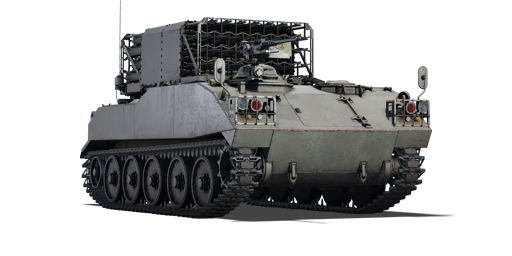Type 75 MLRS
Contents
Description
The Type 75 MLRS is a premium rank Japanese tank destroyer
with a battle rating of (AB), (RB), and (SB). It was introduced in Update 1.83 "Masters of the Sea".
General info
Survivability and armour
Describe armour protection. Note the most well protected and key weak areas. Appreciate the layout of modules as well as the number and location of crew members. Is the level of armour protection sufficient, is the placement of modules helpful for survival in combat?
If necessary use a visual template to indicate the most secure and weak zones of the armour.
Mobility
| Game Mode | Max Speed (km/h) | Weight (tons) | Engine power (horsepower) | Power-to-weight ratio (hp/ton) | |||
|---|---|---|---|---|---|---|---|
| Forward | Reverse | Stock | Upgraded | Stock | Upgraded | ||
| Arcade | Expression error: Unexpected * operator. | 426 | Expression error: Unexpected round operator. | __.__ | |||
| Realistic | 265 | Expression error: Unexpected round operator. | __.__ | ||||
Armaments
Main armament
Give the reader information about the characteristics of the main gun. Assess its effectiveness in a battle based on the reloading speed, ballistics and the power of shells. Do not forget about the flexibility of the fire, that is how quickly the cannon can be aimed at the target, open fire on it and aim at another enemy. Add a link to the main article on the gun: {{main|Name of the weapon}}. Describe in general terms the ammunition available for the main gun. Give advice on how to use them and how to fill the ammunition storage.
Machine guns
Offensive and anti-aircraft machine guns not only allow you to fight some aircraft, but also are effective against lightly armoured vehicles. Evaluate machine guns and give recommendations on its use.
Usage in battles
Describe the tactics of playing in the vehicle, the features of using vehicles in the team and advice on tactics. Refrain from creating a "guide" - do not impose a single point of view but give the reader food for thought. Describe the most dangerous enemies and give recommendations on fighting them. If necessary, note the specifics of the game in different modes (AB, RB, SB).
Pros and cons
Pros:
- Very mobile when driving on flat terrain
- While rockets it possesses aren't the strongest ammunition possible, they can be continuously fired until the ammo rack is empty, and if any of them hit anywhere next to opponent tank armour weak spots, they are very likely to one-shot the entire compartment
Cons:
- Default sights are not helpful for accurately firing rockets; requires user to install a user-made scope that provides firing solutions
- While rockets are protected by "turret" carcass to some extent and will likely just break on kinetic ammo hit, a direct hit of chemical warhead will likely detonate them, destroying the tank.
- It is possible for rockets to hit obstacles next to the tank and destroy it on accident
- Turret depression does not exist on this tank, fighting on uneven terrain without setup or long range will result in almost guaranteed defeat
History
In the mid-60s, the Japanese Military Administration made the decision to boost their Self-Defense Forces’ power with a mobile MLRS on a tracked chassis. As a base, it was suggested that the promising tracked armoured personnel carrier, that was at the time being developed by the Mitsubishi company, be used. The military vehicle was subsequently put into service under the designation Type 73 APC and became a base for a whole series of assault and support vehicles of the Japanese army. In order to equip their army with a modern multiple rocket launcher system, the Japanese used an APC as a base to develop the brand new Type 75 MLRS, as well as two other support vehicles – a mobile weather station and a command vehicle – to ensure the launcher’s combat readiness. The Type 75 was put into service in 1975 and built up serially to 1985 inclusive. The vehicle fired at its opponents using its 130 mm rockets located on 30 launching tubes inside a rotating pod (the horizontal guidance angle was 50 degrees). The Type 75 had a three-man crew and could reach a speed of 50 km/h.
-From Devblog
Media
See also
Links to the articles on the War Thunder Wiki that you think will be useful for the reader, for example:
- reference to the series of the vehicles;
- links to approximate analogues of other nations and research trees.
External links
| Japan tank destroyers | |
|---|---|
| Ro-Go Derivatives | Ro-Go Exp. |
| Chi-Ha Derivatives | Ho-Ni I · Ho-Ni III · Ho-Ro · Chi-Ha LG |
| Ho-Ri | Ho-Ri Prototype · Ho-Ri Production |
| Other | Na-To |
| JGSDF | |
| SPRG | Type 60 (C) |
| SPH | Type 75 · Type 99 |
| ATGM | Type 60 ATM |
| Rocket | Type 75 MLRS |
| USA | ▅M36 |
| Japan premium ground vehicles | |
|---|---|
| Light tanks | Ha-Go Commander · Type 16 (FPS) |
| Medium tanks | Chi-Ha Short Gun · Chi-He (5th Regiment) · Ka-Chi · Chi-Nu II · Type 74 (G) · Type 90 (B) "Fuji" |
| Heavy tanks | Ro-Go · ▅Heavy Tank No.6 |
| Tank destroyers | Ho-Ri Prototype · Type 75 MLRS |





